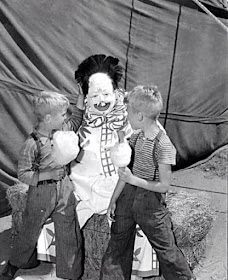WC Fields, a most defiantly disreputable comedian, has fallen out of the public consciousness, but the 75th anniversary of his masterpiece film The Bank Dick seems like a good time to salute one of the 20th-century's most original comic talents. Fields was doing Python-esq things long before Python, admits John Cleese.
William Claude Dukenfield has not been entirely forgotten since his grim alcoholic's death on Christmas Day in 1946, aged 66, of course. He is one of the faces on the cover of iconic album Beatles' Sgt Pepper's Lonely Hearts Club Band, and he even pops up in an episode of The Sopranos: Tony does an imitation of Fields after watching The Bank Dick. Cleese believes that Fields "had the courage and brilliance to make riskier and more profound jokes than Chaplin and Keaton”, and that's certainly true of the subversive humour of The Bank Dick.
At a time when Hollywood was offering a cloying version of family life (such as MGM's Andy Hardy movies), Fields showed the family as a festering hotbed of resentments. In the Bank Dick, written by Fields under the glorious nom de plume Mahatma Kane Jeeves, his character Egbert Sousè is at war with his wife, daughter and mother-in-law. With Fields, there is usually a subtle malice in play about family life, masked by mock affection: "Did you warble my little wren?" he says to his grim-faced wife Agatha. His status-minded wife insists that Sousè "is pronounced Sou-sè. Accent grave over the ‘e’”.
Soused, of course, is Egbert's default state. As the drunken buffoon of Lompoc, California, Egbert's favourite refuge is the Black Pussy Cat café. Fields was a master of mordant quips ("start everyday with a smile - and get it over with") and his routines in the café, including his bantering with bartender Joe, played by Shemp Howard (whose brothers were comedy legends Curly and Moe), are marvellous:
"Was I in here last night, and did I spend a twenty-dollar bill?"
"Yep."
"Oh, boy! What a load that is off my mind. I thought I'd lost it."
"Yep."
"Oh, boy! What a load that is off my mind. I thought I'd lost it."
Fields had a serious drink problem by the time the film was made in 1940, although he made light of it on screen, either through mock formality ("take your hat off in the presence of a gentleman" he says to an unopened bottle of whisky) or jokes at his own expense ("Is that gun loaded?" he says to a child with a toy gun to which his mother retorts: "Certainly not. But I think you are.")
Incredibly, the vast consumption of alcohol had not dampened the physical dexterity of a 60-year-old, who had been one of America's greatest vaudeville jugglers in his youth. In one scene in the Black Pussy Cat café, Fields scrunches up a paper napkin, throws it in the air, catches it on his foot and kicks it away. He made a complex routine look simple.
The plot of The Bank Dick is little more than a series of sketches. After inadvertently capturing a bank robber while drunk, he is given a job as a bank security guard – and is characteristically inept. He sends up small-town pomposity. There is a funny scene in which the fussy bank president Mr Skinner (Pierre Watkin) congratulates Sousé on his daring deed, saying: "I wish to personally give you a hearty handclasp." Of course, the hearty handclasp is as limp as they come.
Fields was always able to send himself up, too. When a little boy points at Fields's bulbous nose and says, "Mommy, doesn't that man have a funny nose?", Fields watches deadpan as the woman replies: "You mustn't make fun of the gentleman, Clifford. You'd like to have a nose like that full of nickels, wouldn't you?"
Lots of Fields's films contain fine slapstick and comedy (and that's true of the whole mean treatment of bank inspector J Pinkerton Snoopington), but the finest thing about Fields is his wordplay.
In a scene with his daughter's dimwitted boyfriend Og Oggilby (played by Grady Sutton), Fields allows his full range of wonderful language to flow as he persuades Og to embezzle for him to finance a mad investment. "Take a chance," says Egbert. "Don't be a luddy-duddy. Don't be a moon calf. Don't be a jabbernow. You're not one of those, are you?"
Fields's characters always blunder along in life and when the money scheme goes wrong, Og shouts: "Oh, I knew this would happen. I was a perfect idiot to ever listen to you." "You listen to me, Og. There's nothing in this world that is perfect," Fields drawls, with his usual exquisite timing.
The Bank Dick was the first solo film Fields made under a new contract at Universal Pictures, after a difficult time at Paramount. It's a glorious testament to his skill and independent thinking.
Don't just take my word for it. The acclaimed film critic Roger Ebert called Fields "the most improbable star in the first century of the movies," adding, "if you are not eventually familiar with Fields you are not a movie lover at all."












































